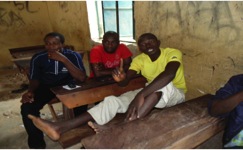
I Am A Girl: Kikelomo Taiwo Writes On The Realities Of Married Adolescents
I was part of a team that conducted a focused group discussion for young married adolescent boys and girls on Female Genital Mutilation and Forced Child-Marriage in Wamba LGA, Nassarawa State, North-central Nigeria. It was quite interesting to see what the evidence/ perspective was from both the males and females.
It is often said that when girls are empowered, communities are also empowered. This statement is very true in many ways.
In Nigeria, Female Genital Mutilation and Forced Child Marriage are harmful practices that still occur and girls have been the most affected. We see girls being forced to a life of pain, sorrow, and poverty- as they are made to marry older men that are as old as their fathers, in many cases and subjected to excruciating pain as their vaginas are being mutilated at childhood. This barbaric act leaves the girl child helpless and vulnerable to physical and sexual violence. It also denies her right to an education and a life of freedom. Often called circumcision, for the girl child it is the mutilation of the exterior of her genitals. The thought of it makes me cringe. Those who practice FGM believe that it restricts the girl child proclivities to being promiscuous. Of course this reason has no social or scientific backing. The claim is baseless!
I was part of a team that conducted a focused group discussion for young married adolescent boys and girls on Female Genital Mutilation and Forced Child-Marriage in Wamba LGA, Nassarawa State, North-central Nigeria. It was quite interesting to see what the evidence/ perspective was from both the males and females.
Boys and girls were separated so the ladies could have freedom of expression. Since it was an Islamic dominated community, it was only culturally sensitive to do so. It was interesting to hear these married adolescents girls share their aspirations of becoming nurses, business women, teachers, and barristers.
 When the girls were asked if they felt they had the power/opportunities to make change happen at the community level, 9 out of 11 said “Yes but they are limited” while 2 said “No they have no power at all”. On the other hand, when their male counterparts were asked the same question, 7 out of 12 said “Yes definitely”, 3 said “Yes but they are limited”, while 2 said “No, they have no power at all”. Obviously, the men feel more empowered because their culture and religion promotes male dominance.
When the girls were asked if they felt they had the power/opportunities to make change happen at the community level, 9 out of 11 said “Yes but they are limited” while 2 said “No they have no power at all”. On the other hand, when their male counterparts were asked the same question, 7 out of 12 said “Yes definitely”, 3 said “Yes but they are limited”, while 2 said “No, they have no power at all”. Obviously, the men feel more empowered because their culture and religion promotes male dominance.
Some of the causes of child marriage they said were; religious reasons, poverty and lack of education. Although, their male counterparts alluded that poverty was a major cause, they also said girls were forced into child marriage to reduce prostitution and unwanted/teenage pregnancy. Isn’t that interesting? Here we begin to see how cultural influences and a lack of education affects people’s mentality and perspective.
As we had further discussions, the girls expressed their displeasure about child marriage and how they thought it could be stopped. Three things came out strongly and they were; enhanced female leadership, provision of safe spaces for young people and community engagement for attitudinal and behavioral change. They also felt the role of young people should be to mobilize and support campaigns against CFM. Interestingly, while some of the males supported the idea that CFM should be stopped, others adamantly insisted that CFM should not be stopped. One of the male respondent said “I don’t think CFM should be stopped. I know that my wife who is in the girls group will never say CFM should be stopped”. Some of the ideas those who agreed that CFM should be stopped are; improved standard of living, free education and orientation to communities especially parents.
Till date, these are the realities of many young Nigerians especially in the north, in communities where young girls have no voice, no right and no choice. Can’t even imagine a life without choice! Many of these girls came to the FGD pregnant, some already had children. Their hopes and dreams dashed because they live in a society where girls are used as a tool for economic empowerment.
It is important that government and other stakeholders begin to engage with communities directly using innovative strategies. Ignorance, poverty, religion and culture are major influencers of these harmful practices and we must work together to ensure that every girl is given a chance at life. A life of being educated and empowered, a life that allows every girl to choose freely without fear. A life where girls are as equal and valuable as boys.
About the Author
 Kikelomo Taiwo is one of Nigeria’s leading youth Advocates on SRHR. She is based in Abuja, Nigeria. Follow her on Twitter @Kikeloms or connect on Facebook.
Kikelomo Taiwo is one of Nigeria’s leading youth Advocates on SRHR. She is based in Abuja, Nigeria. Follow her on Twitter @Kikeloms or connect on Facebook.









